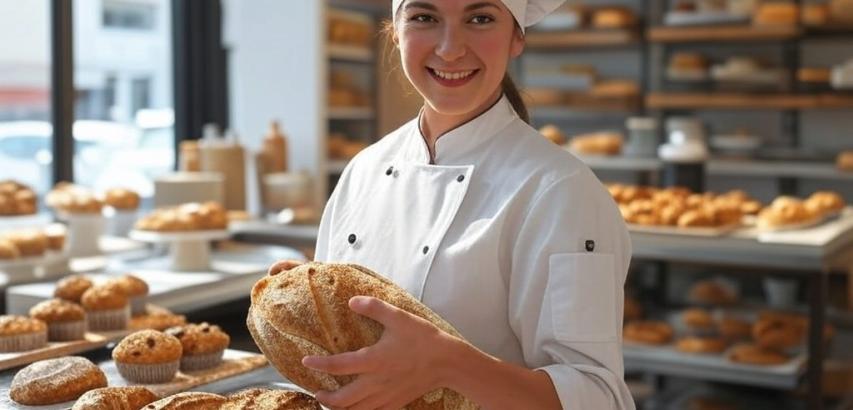Executive Summary
The Smart Bakery Project combines AI-driven customization, IoT-enabled baking, and sustainable practices to disrupt the traditional bakery market. This marketing plan outlines strategies to build brand awareness, attract health-conscious and tech-savvy customers, and position the bakery as a leader in innovation. Key objectives include achieving 10,000 app downloads and 500K in Year 1 revenue through targeted digital campaigns, partnerships, and community engagement.
Marketing Objectives
Brand Awareness: Achieve 70% recognition in target markets (urban professionals, health-conscious consumers) within 12 months.
Customer Acquisition: Acquire 5,000 active app users and 2,000 subscription sign-ups in Year 1.
Market Penetration: Secure partnerships with 10+ corporate clients (offices, event planners) by Q4.
Customer Retention: Maintain an 85% satisfaction rate via personalized engagement and loyalty programs.
Target Audience
Segment | Description |
|---|---|
Health-Conscious Millennials | Ages 25–40, prioritize organic, gluten-free, or vegan options. |
| Busy Urban Professionals | Value convenience, tech-savvy, and willing to pay a premium for quality. |
Corporate Clients | Offices, hotels, and event planners needing bulk orders for meetings/events. |
SWOT Analysis
Strengths | Weaknesses |
|---|---|
AI customization and IoT tech | High initial marketing costs |
Zero-waste sustainability | Limited physical presence (initially online-focused) |
Opportunities | Threats |
| Rising demand for personalized food | Competition from established bakeries |
Corporate wellness trends | Economic downturns impacting discretionary spending |
Brand Positioning Statement
“Smart Bakery: Where innovation meets tradition, crafting bespoke, healthy baked goods tailored to your taste—fresh from our AI-powered ovens to your table.”
Marketing Strategies
Digital Marketing
SEO & Content Marketing:
Target keywords: “custom bakery near me,” “healthy bread delivery,” “AI-designed cakes.”
Blog posts: “How AI is Revolutionizing Baking” and “5 Benefits of Gluten-Free Diets.”
Social Media:
Platforms: Instagram, TikTok, Pinterest (visual focus).
Content Ideas:
Time-lapse videos of AI designing and baking cakes.
Customer testimonials showcasing personalized orders.
“Meet the Smart Oven” behind-the-scenes reels.
Email Marketing:
Build a subscriber list with a 10% discount for sign-ups.
Send weekly newsletters with recipe ideas, promotions, and sustainability updates.
Partnerships & Collaborations
Influencers: Partner with food bloggers, nutritionists, and tech influencers to promote AI customization.
Corporate Wellness Programs: Offer discounted subscriptions to offices for employee wellness initiatives.
Food Delivery Apps: List on Uber Eats, Deliveroo, and local platforms with a “Smart Bakery” badge for visibility.
Community Engagement
Pop-Up Events: Host “Future of Baking” tastings in tech hubs or co-working spaces.
Workshops: Free “Design Your Own Smart Cookie” sessions for families and schools.
Sustainability Drives: Promote zero-waste initiatives via social media challenges (e.g., “Share Your Zero-Waste Recipe”).
Referral & Loyalty Programs
Refer-a-Friend: Offer 10 credit for every successful referral.
Loyalty Rewards: Earn points for app orders, social shares, and reviews (redeemable for free products).
Budget Allocation
Channel | Budget (Year 1) | Key Activities |
|---|---|---|
Digital Ads | 40,000 | Google Ads, Instagram/Facebook campaigns. |
Influencer Marketing | 25,000 | Collaborations with micro-influencers. |
Content Creation | 15,000 | Videos, blogs, recipe tutorials. |
Community Events | 10,000 | Pop-up tastings, workshops. |
App Promotions | 10,000 | In-app discounts, referral incentives. |
Total | 100,000 |
Key Performance Indicators (KPIs)
Website Traffic: 50,000 unique visitors in Year 1.
App Downloads: 10,000+ in Year 1.
Conversion Rate: 20% from website visitors to app users.
Social Engagement: 15% average engagement rate on posts.
Customer Retention: 75% repeat orders within 3 months.
Risk Mitigation
Low Adoption: Offer free samples at events and app-exclusive discounts.
Negative Tech Perception: Educate customers via blog posts and videos on AI’s role in enhancing (not replacing) artisanal baking.
Supply Chain Delays: Partner with multiple local suppliers and maintain a 10% buffer stock.
Timeline
Phase | Activities | Timeline |
|---|---|---|
Pre-Launch | Finalize app, influencer partnerships, soft launch. | Months 1–2 |
Launch | Full app release, digital ad blitz, pop-up events. | Months 3–4 |
Growth | Expand corporate partnerships, loyalty programs. | Months 5–12 |
Conclusion
This marketing plan leverages technology, sustainability, and hyper-personalization to position the Smart Bakery as a trailblazer in the food-tech space. By focusing on digital engagement, strategic partnerships, and community trust, the project will drive rapid adoption and achieve 1.2M in revenue by Year 2.
Next Steps:
Finalize influencer contracts and app beta testing.
Launch targeted ads in high-demand urban areas (e.g., San Francisco, Berlin).
Monitor KPIs monthly and adjust campaigns based on analytics.
This plan ensures the Smart Bakery Project stands out in a competitive market while aligning with modern consumer values of health, convenience, and innovation.
 |  |  |
